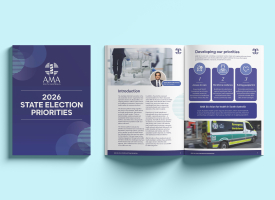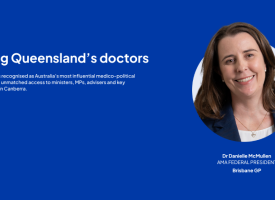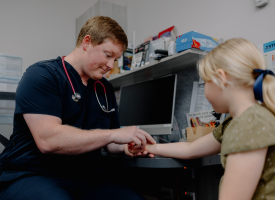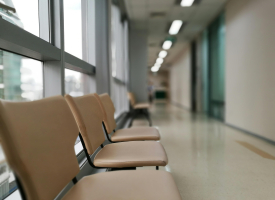AMA President Professor Steve Robson on calls for National Cabinet to release medical and health advice
Transcript: AMA President, Professor Stephen Robson, Doorstop Media Appearance at Australian Parliament House, Thursday, 1 September 2022
Subject: Need for National Cabinet to release health advice on reduced COVID isolation period, health workforce, Centre for Disease Control, cosmetic surgery, vaping

STEVE ROBSON: The AMA, like a lot of medical groups and doctors around the country, were puzzled by the decision yesterday, the political decision to reduce isolation for people with COVID from seven to five days to help deal with the workforce, certainly in non-vulnerable workplaces. We're puzzled why they won't release the health advice underpinning that. At the moment, we're calling for that to be released so the politicians can justify to the public why they're making this decision if it is different to the advice that they're receiving from their health teams around the country. So that's really the basis of what we're talking about. But we know there's a lot going on at the moment with the recommendations into cosmetic surgery and health workforce, which is a key component of the Jobs and Skills Summit today. So happy to take any questions on those issues that you've got.
QUESTION: Just on that. So first of all, we've heard some new health studies come out that say most infections are over by five days. Do you have access to some of those same studies that the epidemiologists have? So what do you make of those arguments, that essentially most of the people going out who are asymptomatic in the community aren't infectious or aren't a danger to the community? And just building- actually, I'll just leave it at that- I'll leave it at that, first.
STEVE ROBSON: [Laughs] No worries. Best information we have at the moment is up to a third of people, even if they feel well and don't have any symptoms, are potentially infectious. So if you're looking at a strategy to reduce COVID's effect on the workplace, it may not work as you intended. And if they're making these changes from next week, they're going to need to monitor very, very closely to make sure they're not making things worse.
QUESTION: And so- and then to follow up on that. The government says that now's an appropriate time, that we can't have isolation periods forever, that people need to take personal responsibility. So what do you make of the argument that eventually COVID has to become just like every other infectious disease - people with flu have to stay home, for example, but there's no mandatory isolation period?
STEVE ROBSON: I think it's a furphy to think that COVID is the same as the flu or a cold. We know that it's a multi-system disease that potentially has enormous long-term impacts on people. And we're seeing huge effects on the workforce from long COVID at the moment. So it's very different for other infectious diseases and it needs to be treated differently.
QUESTION: What can we learn from other countries that have reduced their isolation period?
STEVE ROBSON: I think what we've seen overseas is a devastating effect on health systems and workforces, and we need to learn from that. In particular, we've got a system at the moment where the government admits that seven-day isolation is required for vulnerable settings, but only five for other settings. But they completely forget there may well be vulnerable workers in workplaces, or they're going home to vulnerable family members. So I think this has got to be thought through and you can't have a bet each way, which is what they seem to be doing at the moment.
QUESTION: Just on that as well…
QUESTION: [Talks over] Does the Prime Minister- sorry, you go.
QUESTION: No, sorry. Just on that, just a follow up, should people in those vulnerable categories be concerned about these changes?
STEVE ROBSON: I think a lot of people in vulnerable categories are using their personal responsibility and their families around them are, and it's a really big ask to rely on that to protect them from the general community. It's a big leap.
QUESTION: The- sorry, no…
QUESTION: Just in terms of public- publishing the medical advice, one of the avenues that would be- could be done through [indistinct] which is something you've been calling for, a Centre for Disease Control. I'm just wondering what the consultation of the AMA from the government has been like. Has it started? Have they spoken to [indistinct]?
STEVE ROBSON: On the CDC?
QUESTION: Yeah.
STEVE ROBSON: We're strong supporters of the CDC. We've spoken to the Minister about this and we're actually working with other groups like the Public Health Association to try to recommend to the Minister what a model would be. But it's really important that we take the advice out of the political sphere and make it health advice that applies to the whole country to protect us all.
QUESTION: But the government says that they've been consulted over the last few weeks. Has that been with the AMA in the last few weeks?
*** QUESTION WAS NOT HEARD AND THE BELOW ANSWER WAS GIVEN IN REFERENCE TO NATIONAL CABINET DECISION, NOT THE CDC***
STEVE ROBSON: So the consultation going on at the moment, we're not sure who it's with. They're not releasing that advice. We would love to see it. And most doctors around the country are scratching their heads on what this advice is that they're getting, because it doesn't tell them what we're [indistinct].
QUESTION: National Cabinet doesn't normally release this sort of advice. Why do you want this advice, this particularly to be released?
STEVE ROBSON: Because this is a major change that's got enormous potential ramifications through the community. And it really is a political decision that's at odds with a lot of doctor's thinking around the country. So we'd really like to see that advice.
QUESTION: The Prime Minister earlier in the week essentially tried to say that there were no documents to be released, that most of the discussions around National Cabinet were entirely preferable. Do you buy that argument?
STEVE ROBSON: I don't know what goes on with making these decisions at the National Cabinet. They should be based on health advice and we'd love to see the advice that they were given. It should be available. It should be part of their briefing papers. We'd love to see it.
QUESTION: Just on what you were saying a second ago about, it sort of seems to run counter to what other doctors are saying. You said something in your opening comments that if the National Cabinet had made a decision that was different to health advice, they should justify it. Do you believe that they have made a decision that was not in keeping with the health advice that they might have received?
STEVE ROBSON: Certainly. If you listen to many, many doctors and organisations and the AMA around the country, we're scratching our heads as to why they've made the judgements they've made. If that's with other information that's different and they're withholding, that might influence the decision, we would love to see it. If not, they need to justify to the Australian community why they're making decisions that really run counter to the best advice.
QUESTION: Do you think that this is going to increase the number of COVID cases around the country?
STEVE ROBSON: It's got the potential to do that. So if you're making the decision to increase the workforce availability and decreasing pressures, you've got to be very careful when you're not doing the exact opposite to that. So we urge incredibly close monitoring from this point forward.
QUESTION: Given that we're essentially in a sort of self-monitoring cycle now, where people have to front up about the fact that they've tested positive, what do you make of the argument that actually making restrictions less [indistinct]- own risk will increase compliance?
STEVE ROBSON: So one of the problems, I think, for many, many workers is that they're at a big financial disadvantage if they have to isolate. That's somewhat mitigated by the pandemic payments, but they're going to stop soon. So that'll give people who are vulnerable, people who're financially on the back foot, a reason to perhaps try and sidestep things so they can get back into the workforce. We think that's a bad signal for the government to give.
QUESTION: It's unlikely that these changes won't go ahead. What else should the government be doing to protect vulnerable people?
STEVE ROBSON: The government needs to look very carefully at the groups who are most vulnerable. If we're looking at the enormous rates of death that we're seeing in the community at the moment, they're often in vulnerable people and in aged care. So if we're making these changes, we have to pull out all the stops to make sure that we protect people in aged care, in hospital settings, and other members of the community, for example, people with chronic health problems.
QUESTION: And just to clarify on your comments [indistinct], the AMA was not consulted about any of these changes. Is that correct?
STEVE ROBSON: We were not specifically consulted about the changes that the National Cabinet made, no.
QUESTION: What do you mean, not specifically? What were you consulted about?
STEVE ROBSON: Okay. So the question was about this National Cabinet?
QUESTION: So, you weren't consulted about this particular change from isolation; to change the isolation period from seven to five days. There was no consultation with the AMA. Is that correct?
STEVE ROBSON: We've made our views very clear, but we're not specifically consulted about that decision.
QUESTION: We've had a couple of unions call for isolation to be scrapped entirely as it has been in the UK. I take your point that it's different from the flu. What would the COVID situation need to be like for you to back a scrapping of isolation entirely?
STEVE ROBSON: So backing a total scrap in isolation puts huge numbers of people at risk. And one of the big things that people are not taking into account is long COVID. And we're now seeing a total tsunami of long COVID in the community. Unless we have a national plan to deal with this then we've got to be very careful in what we do.
QUESTION: The health ministers from around the country are meeting tomorrow. We have been having these discussions around the rules around cosmetic surgery. So what are you asking for the health ministers to do in that meeting tomorrow?
STEVE ROBSON: We've all seen some absolutely horrific images of cosmetic surgery within the country and an industry that has to be controlled. Two things that the health ministers could do immediately is to protect the title of surgeon so that the public aren't misled. So you can only call yourself a surgeon if you've actually had training and you're a surgeon; and secondly, crack down immediately on misleading advertising, using patient testimonials and things like that so that the public are not led up the garden path by charlatans.
QUESTION: What are the legal sort of frameworks around making those changes? So I guess if they can make those changes tomorrow, it doesn't have to pass through legislation. Can you just talk us through exactly how that would work in terms of the legal framework?
STEVE ROBSON: So what we need to do is protect a title and that's something the government can do very quickly.
QUESTION: Different topic. The AMA was very supportive of bans on vaping. It seems that-
STEVE ROBSON: On?
QUESTION: On vaping.
STEVE ROBSON: Yes.
QUESTION: It seems, you know, from a few articles that are out there that compliance is actually fairly low. People are finding it very easy to get around. What needs to be done, in your view, to enforce the rules that have just been put in place?
STEVE ROBSON: So a lot of the rules around vaping are actually in consumer law and they're different in different states. Like, Queensland, for example, has got very lax laws and we actually gave an award for how terrible they were in vaping. So we need the state and territory governments to come together and do everything they can to stop our young, vulnerable children being hooked on vapes the way they are at the moment. It's a national disgrace.
QUESTION: What do you make of the argument that vaping actually weans people off tobacco, which is [indistinct]?
STEVE ROBSON: There is no evidence for that at all. It is a way for big tobacco and big vape to hook a new generation of vapers, and that's a bad thing for our children.
QUESTION: Thank you.
STEVE ROBSON: No worries, cheers.



